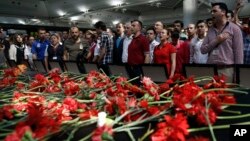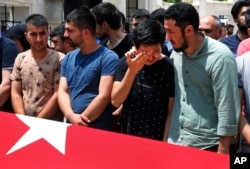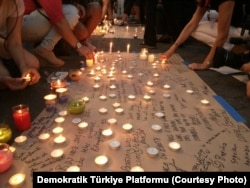Responsibility for Tuesday's Istanbul airport attack is centering on one key suspect: Akhmad Chataev, a man with a long history of involvement in jihadist activities, beginning in Chechnya and ending in Syria.
At least 44 people were killed and more than 230 others wounded Tuesday when three men attacked Ataturk airport, Turkey's largest, first opening fire with automatic rifles and then detonating bombs attached to their bodies. Turkish officials say they believe the attack was carried out by Islamic State fighters.
The three suicide attackers who carried out the devastating attack in Istanbul were nationals of Russia, Uzbekistan and Kyrgyzstan, Western news agencies reported Thursday, quoting a senior Turkish official.
The identities of the bombers have not been made public. However, Turkish media named two Russian nationals from the North Caucasus region as having been involved in the attack.
Alleged mastermind’s history
The Turkish pro-government newspaper Yeni Safak reported Thursday that Akhmed Chataev, a native of Chechnya in Russia's North Caucasus, is thought to have been the attack's mastermind.
According to sources in Chechen Islamic groups, Chataev, a native of the Chechen village of Vedeno, was a trusted associate of the late Doku Umarov, the leader of the self-proclaimed Caucasus Emirate, who tasked Chataev with fundraising and recruiting abroad.
Chataev left Russia in 2001 and applied for asylum in Austria; he received Austrian citizenship in 2003. Chataev's Austrian passport allowed him to travel freely in Europe and elsewhere.
In 2010, he was arrested in Ukraine at the request of Russia's security services but later released. In 2011, he was arrested on the Bulgaria-Turkey border. He appealed the arrest and a court ordered his release under the Geneva Refugee Convention.
Radio Free Europe/Radio Liberty reported that Chataev lived in Georgia between 2010 and 2012, and in 2013 was involved in a shootout between a Chechen Islamist group and Georgian security forces in Georgia's Lopota Gorge.
Chataev was wounded and arrested, but later released on the order of a court.
Chataev lived in Turkey between 2012 and 2015, according to the Russian independent news agency Caucasian Knot. He continued to travel, and at one point was briefly detained by the Belgian police.
While in Turkey, Chataev came into direct contact with Tarkhan Batirashvili, aka Umar al-Shishani — a senior IS commander.
In February 2015, Chataev appeared on an IS YouTube video shot in Syria, claiming to be commander of the Yarmuk Batalion, a Russian-speaking IS unit.
In October 2015, the U.S. Department of Treasury added Akhmed Chataev to its list of specially designated global terrorists.
While Turkey's security services have not confirmed Chataev's alleged involvement in the Istanbul attack, the experts that VOA talked to said it is highly likely he masterminded it.
Bomber’s identity unclear
Yeni Safak also identified one of the suicide bombers as Osman Vadinov, a Russian citizen from Dagestan, which neighbors Chechnya in Russia's North Caucasus region.
Turkey's Hurriyet newspaper also named Osman Vadinov as one of the attackers, and said he had traveled from Raqqa, the de facto IS "capital" in Syria, to carry out the attack. But Hurriyet said Vadinov was a native of Chechnya, not Dagestan.
However, experts say the name "Vadinov" does not originate in the North Caucasus.
"The last name Vadinov is neither Dagestani nor Chechen," Abdurashid Saidov, a Dagestani ethnographer and political analyst, told VOA via Facebook messenger.
Yuliya Yuzik, a prominent Russian reporter who is running as a candidate in Dagestan's parliamentary elections later this year, said "Osman Vadinov" is not a Dagestani.
"My sources said he is not our guy," Yuzik wrote in response to questions from VOA.
The last name "Vadinov" is common in Kazakhstan's Almaty district — and in Bulgaria. However, if, as Turkish media have reported, Turkey's security services identified the bomber by his passport, this raises the question of whether his passport was real or forged. If it was forged, the experts suggested, then the trail still leads to Dagestan, where the document possibly originated.
Sources in Turkey's several thousand strong Dagestani Salafist diaspora told VOA: "Nobody has ever heard of a guy named Osman Vadinov."






